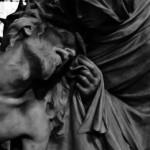We run our website the way we wished the whole internet worked: we provide high quality original content with no ads. We are funded solely by your direct support. Please consider supporting this project.
War in the Heavens!
What does spiritual warfare look like from the perspective of the physical world? Our friend David D. Flowers speculated on that question in a post he entitled Dark Matter vs Dark Energy: War in the Heavens. Referencing Greg’s Satan and the Problem of Evil, David considers the possibility that the interaction between dark matter and dark energy that scientists have observed is merely the physical consequences of a much deeper war in the heavenly realm. Check it out!
From David’s article:
Astronomers and theoretical physicists state that both dark matter and dark energy once worked together, from the moment of the Big Bang to be precise, but dark energy began accelerating expansion and working against the ordering forces of dark matter around 5 billion years ago.
“…the expansion rate of the cosmos began speeding up about 5 billion to 6 billion years ago, like a roller coaster zooming down a track. That is when astronomers believe that dark energy’s repulsive force overtook gravity’s attractive grip.” Adam Riess, prof of physics & astronomy at Johns Hopkins University
In other words, dark energy is working to rip space apart and repel the unifying “gravitational” forces of dark matter. These are the scientific facts. And this blog post is my theological interpretation of those facts.
Category: General
Tags: David D. Flowers, God, Quantum Physics, Satan, Satan and the Problem of Evil, Warfare Worldview
Related Reading

Did Jesus Say That God Causes Blindness?
As he went along, he saw a man blind from birth. His disciples asked him, “Rabbi, who sinned, this man or his parents, that he was born blind?” “Neither this man nor his parents sinned,” said Jesus, “but this happened so that the works of God might be displayed in him (Jn 9:1-3, NIV) Commentators typically appeal to this passage…

What is the Warfare Worldview?
The warfare worldview is based on the conviction that our world is engaged in a cosmic war between a myriad of agents, both human and angelic, that have aligned themselves with either God or Satan. We believe this worldview best reflects the response to evil depicted throughout the Bible. For example, Jesus unequivocally opposed evils…

What is the warfare worldview?
The warfare worldview is based on the conviction that our world is engaged in a cosmic war between a myriad of agents, both human and angelic, that have aligned themselves with either God or Satan. This is the view that is presupposed throughout the entire Bible, and it’s especially evident in the New Testament. For…

Q&A: If God is So Great, Why Would He Care About Us?
Question: I’ve read that scientists estimate that the number of stars in the universe is 10 to the 24th power (10 with 24 zeros after it). I’m told that finding the earth amidst all these stars would be like finding one particular grain of sand in a sand pile the size of the United States piled…

A Foolish and Weak-Looking God
The New Testament assumes that the God of Israel and the God revealed in Jesus Christ are one and the same God. But there also can be no question that the portrait of God that was unveiled when the Messiah arrived on the scene was in some respects quite different from what the OT had…

Podcast: How Have Your Views on Hell Changed Since Writing Satan and the Problem of Evil?
Greg travels down memory lane and considers hell and annihilationism. Has his views changed? Will he stand his ground? Will he confess to being wrong? Find out in this thrilling, short adventure episode! http://traffic.libsyn.com/askgregboyd/Episode_0117.mp3

